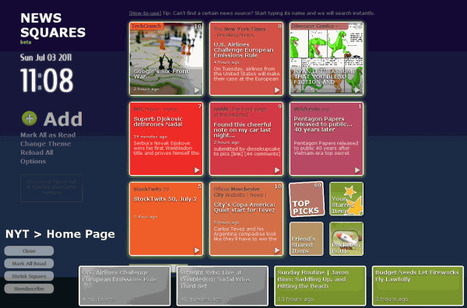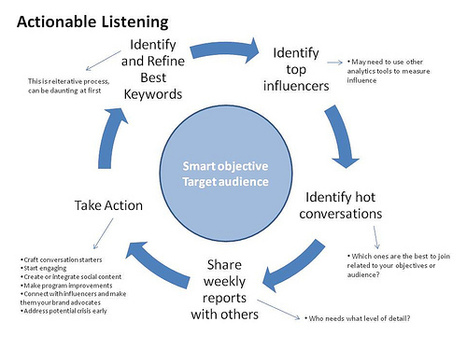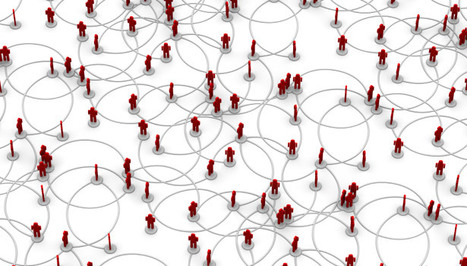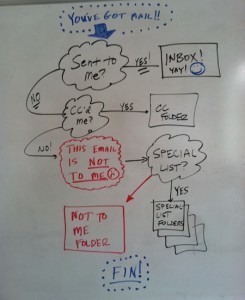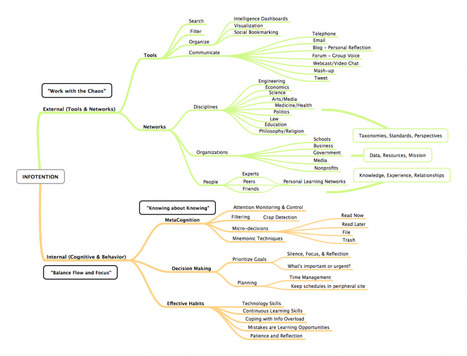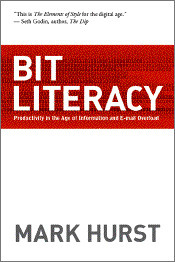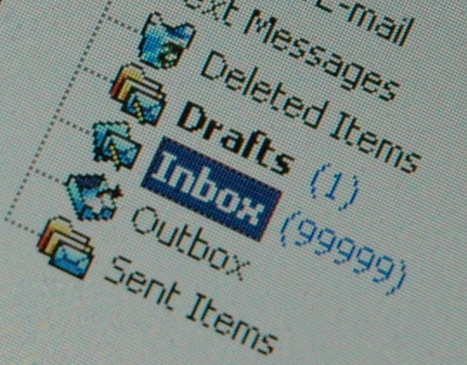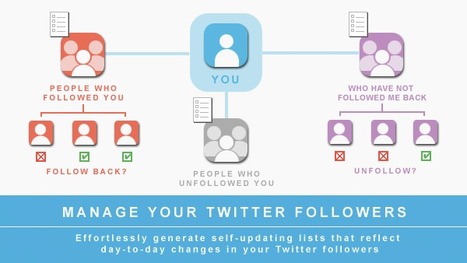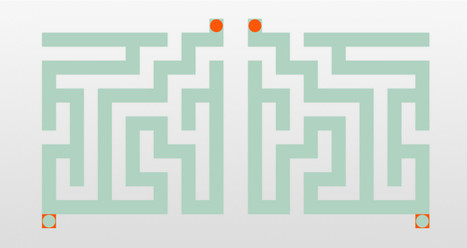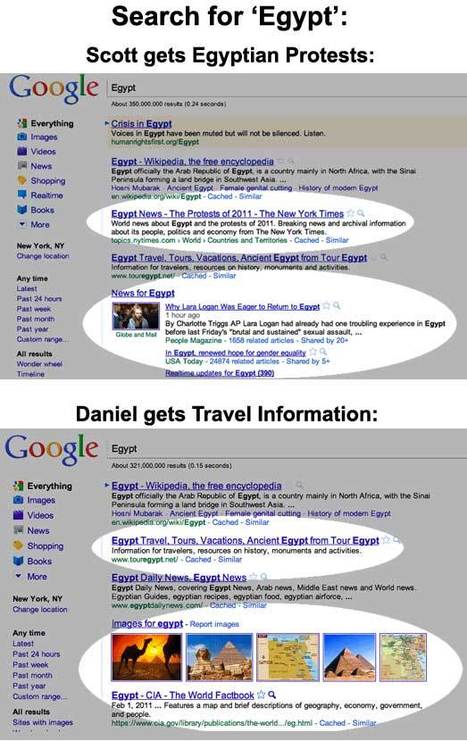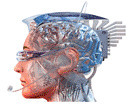 Your new post is loading...
 Your new post is loading...

|
Scooped by
Howard Rheingold
July 8, 2011 9:40 PM
|
So can computers actually help improve our concentration and contemplation, instead of leading us into distraction?
The problem, as Pang puts it, is that "Technologies that were supposed to help us think better, work more efficiently, and connect more meaningfully with others now interrupt us, divide our attention, and stretch us thin."
Pang suggests that we don't have to choose between information technology and contemplation, and suggests contemplative computing as a new way forward.

|
Scooped by
Howard Rheingold
July 4, 2011 12:16 PM
|
Not all RSS readers are the same. Indeed, some are far more useful than others and deserve to be pulled from the pack. One such reader is NewsSquares, a Chrome app specifically catered to the interests of news readers. While still in the final beta stages, NewsSquares is a great way to browse your various news feeds while enjoying a very visually appealing means of access.

|
Scooped by
Howard Rheingold
June 29, 2011 4:37 PM
|
Actionable listeningon social media channels means transforming a “river of noise” into insights that allow you to take action. That is, you gain insight, can make a decision, or do something. Listening can help your organization craft conversation starters, figure out how to best start engaging, identify social content that you can incorporate into your content strategy, identify influencers who you can transform into brand ambassadors, or address a potential crisis early in the game.

|
Scooped by
Howard Rheingold
June 26, 2011 3:25 PM
|
At its core, network learning is a way to deal with an ever-increasing amount of digital information. It requires an open attitude toward learning and finding new things. Each worker needs to develop individualized processes of filing, classifying and annotating information for later retrieval.

|
Scooped by
Howard Rheingold
June 25, 2011 5:24 PM
|
Try this for a day: don't answer every phone call. Stop checking your email every two minutes. And leave work early. You'll be astounded at how much more you'll get done.
According to a study published in the Psychological Review conducted by Dr. K. Anders Ericcson, the key to great success is working harder in short bursts of time. Then give yourself a break before getting back to work.

|
Scooped by
Howard Rheingold
June 25, 2011 3:34 PM
|
The New Twitter UI doesn't show an RSS feed for the user you're looking at anymore. Instead, it only shows you an RSS feed for your own tweets, which seems sort of vainglorious to me.
Here's a bookmarklet, written by @jacobrothstein and converted by @alexch using Gruber's Bookmarklet Builder script.
Drag this little dude to your bookmarks bar and click it when you're on someone's timeline. It'll put an "RSS" link right under the user's bio, for you to click or copy.

|
Scooped by
Howard Rheingold
June 23, 2011 2:02 PM
|
9. Cognitive Load Management: The ability to discriminate and filter information for importance, and to understand how to maximize cognitive functioning using a variety of tools and techniques

|
Scooped by
Howard Rheingold
June 22, 2011 6:54 PM
|
The "Habit Design Meetup" (@habitdesign) is a national meetup for sharing best-practices in developing sustainable, consistent daily habits (or "agile self-development") via Behavior-Change Psychology...

|
Scooped by
Howard Rheingold
June 22, 2011 12:25 PM
|
I’m not getting any less e-mail these days, but I have devised a scheme which is helping me keep it under control. The basic premise is that I am prioritizing e-mail by how directly it has been sent to me. In the first section of this post, I will outline how I prioritize the mail, and in the second section I will explain how I process the mail.

|
Scooped by
Howard Rheingold
June 21, 2011 5:40 PM
|
Click on the photo to comment, share or view other great photos (RT @hrheingold: Another awesome #infotention mindmap from #mindamp co-learner @chadgorski http://yfrog.com/hsjubup...)...

|
Scooped by
Howard Rheingold
June 19, 2011 5:43 PM
|
Mark Hurst's book on managing information overload in the digital age.

|
Scooped by
Howard Rheingold
June 19, 2011 2:19 PM
|
But there is a more interesting answer: the dynamic symbiosis of technology and mentality. A symbiosis is to the mutual benefit of two different species but requires mutual adaptation. Consider the invention that has changed human mental life more than anything else, writing and, subsequently, the printing press. Writing made analysis possible: One can compare texts, which is difficult in an oral tradition.

|
Scooped by
Howard Rheingold
June 18, 2011 12:27 PM
|
Twist Image president Mitch Joel offers his tips for handling email overload. His advice goes over some ground we’ve covered about before, such as using rules and folders/labels, but one tip really stood out to me: You should tell people in your emails how to work with you.
|

|
Scooped by
Howard Rheingold
July 6, 2011 1:01 PM
|
The process still requires me to see things; it is a "who and what" pass through the information. I learned very quickly not to really read things on first pass, but to look at headlines of the individual feed items, and anything of remote interest gets opened into a Web browser with tabs. Paying attention to the source of the information, as well as to the headline, helps decide whether something gets opened in a browser tab

|
Scooped by
Howard Rheingold
June 30, 2011 5:16 PM
|
Apture has just launched a feature that could change that. “Hotspots,” which builds on Apture’s Highlights function, leverages the curiosity of the crowd to determine, quite literally, the web’s “missing links.” The feature measures and tracks the number of times users have highlighted certain text within Apture-enabled websites; and then — here’s the very, very cool part — automatically creates a cluster of contextual information to support that text, via Wikipedia, YouTube, maps, and more. It’s Apture’s in-line-but-also-expandable version of a hyperlink.

|
Scooped by
Howard Rheingold
June 29, 2011 2:46 PM
|
Formulists lets you organise Twitter into smart, auto-updating Twitter lists: Filter based on location/bio keywords, Twitter activity, and more!

|
Scooped by
Howard Rheingold
June 26, 2011 1:55 PM
|
Our lives are overburdened by commitments and stressed from information overload and the demands of living in the Information Age. “I don’t have the time to meditate” is a familiar refrain.
Well, you do have the time; if you are breathing you have the opportunity to meditate. In any moment, you can bring your attention to what it feels like to breathe right now, even if this is just for one cycle of the breath – in and out. Do this for a few seconds, or even a few minutes. Your day could be punctuated with moments where the simple, natural, and physical process of your breathing becomes the focus of your attention.

|
Scooped by
Howard Rheingold
June 25, 2011 3:49 PM
|
Why do I constantly update my Google Reader RSS feeds? Adding categories, fine tuning reading lists, then upsetting them all over again when I stumble upon several great sites. That's because I rely on information discovery to push my own thinking.

|
Scooped by
Howard Rheingold
June 25, 2011 1:00 PM
|
We create economic value out of information when we figure out an effective strategy that includes aggregating, filtering and connecting.

|
Scooped by
Howard Rheingold
June 22, 2011 7:48 PM
|
Refine & Reclaim your time on Twitter & Facebook via filters: with Refynr, an ad-free web app that filters the clutter out of Social Media & saves the "Refyned" feeds to for later.

|
Scooped by
Howard Rheingold
June 22, 2011 2:59 PM
|
ScraperWiki is an online tool to make that process simpler and more collaborative. Anyone can write a screen scraper using the online editor. In the free version, the code and data are shared with the world. Because it's a wiki, other programmers can contribute to and improve the code.

|
Scooped by
Howard Rheingold
June 21, 2011 6:39 PM
|
A new app helps you stay on task by showing where you spend your time online and giving that information to your co-workers.

|
Scooped by
Howard Rheingold
June 20, 2011 6:58 PM
|
Escape your search engine Filter Bubble!
An illustrated guide

|
Scooped by
Howard Rheingold
June 19, 2011 2:20 PM
|
AugCog is an emerging field of science that seeks to extend a user's abilities via computational technologies, which are explicitly designed to address bottlenecks, limitations, and biases in cognition and to improve decision making capabilities

|
Scooped by
Howard Rheingold
June 19, 2011 11:39 AM
|
Regator is a selective blog directory and search engine. It's the easiest way to find, share, and read quality posts from hand-selected blogs in over 500 topics.
|



 Your new post is loading...
Your new post is loading...



